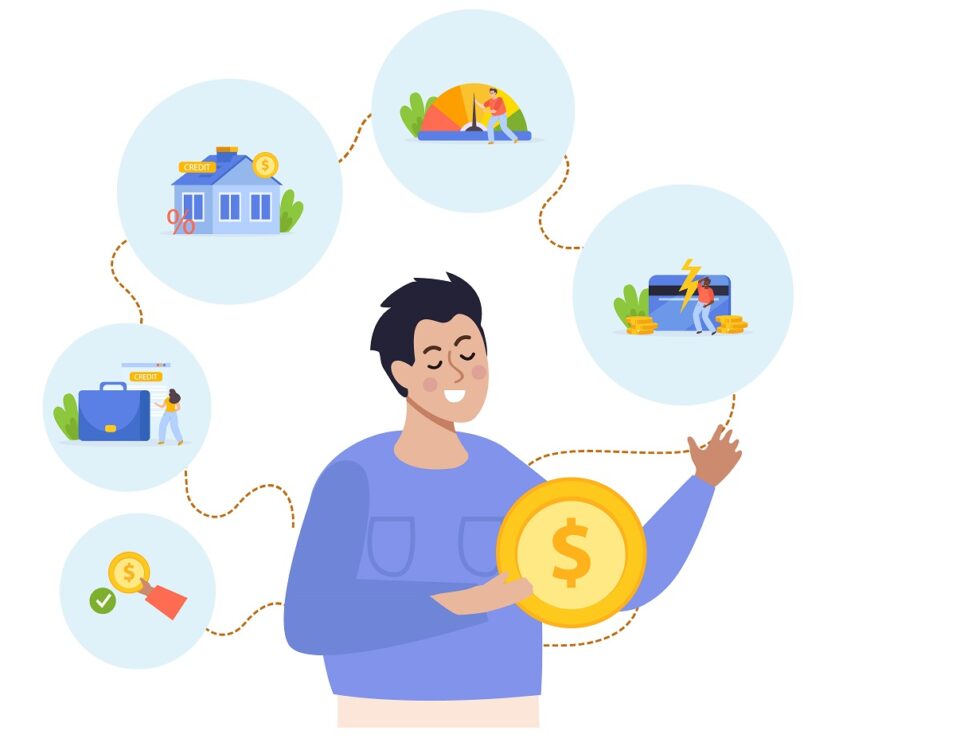- Credit Restoration Experts Nationwide

How to Request a TransUnion Credit Freeze?
November 17, 2023
Wondering How to Gain Credit Confidence? Learn from a Personal Credit Coach
November 28, 2023Why Did My Credit Score Drop After Paying Off Debt?

Your credit score is a numerical representation of your creditworthiness, and it plays a crucial role in determining your eligibility for loans, credit cards, and other financial opportunities. Best Credit Repair Companies 2023 can help you comprehend why your credit score may fluctuate even after making strides in debt repayment. Grasp the key factors that contribute to its calculation. These may include:
- Payment History: At the core of your credit score lies your payment history. This factor carries significant weight and reflects how reliably you’ve met your financial obligations. Timely payments contribute positively to your score, while late payments, defaults, or bankruptcies can have adverse effects.
- Credit Utilization: Another critical aspect is your credit utilization ratio, which is the proportion of your credit card balances to your credit limits. Lower utilization is generally favorable for your credit score. However, the intricacies of this factor merit attention, as paying off debt can affect this ratio and, consequently, your credit score.
- Length of Credit History: The length of time you’ve been using credit also influences your score. Closing old accounts or paying off significant debts might impact the average age of your credit history, potentially affecting your creditworthiness.
- New Credit: Opening multiple new credit accounts within a short period may be perceived as risky behavior. While responsibly managing credit is essential, a sudden influx of new credit could influence your credit score.
- Types of Credit: Credit scoring models consider the diversity of your credit accounts, including credit cards, mortgages, and installment loans. A mix of different types of credit can positively contribute to your credit score.
Providing a clear overview of these fundamental credit score components sets the stage for understanding why paying off debt might not always yield an immediate positive impact. The intricate interplay of these factors and their dynamic nature contribute to the complexity of credit scoring, making it crucial for individuals to navigate their financial decisions with a holistic understanding of these dynamics.
Impact of Closed Accounts on Credit Scores
When you diligently work towards paying off your debts, it’s natural to expect a positive impact on your credit score. However, an unexpected consequence can arise when accounts are closed as a result of debt repayment. Understanding the dynamics of closed accounts and their potential consequences on your credit score is crucial for maintaining financial health.
Closing Accounts and Credit Score Dynamics
Paying off a credit card or a loan often leads to the lender closing the account. While this might seem counterintuitive, it’s a common practice. Closed accounts can impact your credit score because they contribute to several key factors that credit scoring models consider.
Role of Account Age in Credit Scores
One vital aspect affected by closing accounts is the average age of your credit accounts. The length of your credit history plays a significant role in determining your credit score. As you pay off and close older accounts, the average age of your remaining accounts decreases. Credit scoring models generally favor a longer credit history, as they provide a more comprehensive view of your financial responsibility.
Average Length of Credit History and Credit Scores
The average length of your credit history is calculated by taking the sum of the ages of all your credit accounts and dividing it by the total number of accounts. Closing older accounts shortens this average, potentially impacting your credit score negatively. Lenders often view a longer credit history as an indicator of stability and responsible financial behavior.
Mitigating the Impact
While closing accounts can have a temporary negative impact, it’s essential to balance this against the positive effects of reducing overall debt. If possible, consider keeping your oldest accounts open, even if they have a zero balance. This strategy helps maintain a longer average credit history.
Strategic Account Management
Strategically managing your accounts post-debt repayment is crucial. Instead of closing accounts immediately after paying them off, assess the potential impact on your credit score. Explore alternatives, such as keeping accounts open with minimal activity, to demonstrate a consistent and responsible credit history.
Thus, the impact of closed accounts on your credit score is a nuanced aspect of personal finance. While the immediate closure of accounts after debt repayment can cause a dip in your credit score, a thoughtful approach to account management can help mitigate these effects. Balancing the positive steps of reducing debt with the potential drawbacks of closed accounts is key to maintaining a healthy credit profile.
Changes in Credit Utilization Ratio
The credit utilization ratio plays a pivotal role in determining your creditworthiness. It represents the proportion of your credit card balances relative to your credit limits and is a key factor in the calculation of your credit score. While it’s commonly believed that paying off debt should automatically boost your credit score by reducing your credit utilization ratio, the reality is more nuanced.
Understanding Credit Utilization Ratio
The credit utilization ratio is calculated by dividing the total credit card balances you owe by the sum of your credit limits. For example, if you have a total credit limit of $10,000 and carry a balance of $2,000, your credit utilization ratio is 20%. Credit bureaus typically consider a lower ratio more favorable as it suggests responsible credit management.
Paying Off Debt and Credit Utilization
When you pay off debt, you effectively reduce the outstanding balances on your credit cards. This, in turn, should lead to a lower credit utilization ratio, which is generally beneficial for your credit score. However, the impact on your credit score may not be immediate, and there are several reasons for this delay.
Nuances and Potential Reasons for Delayed Impact
- Credit Reporting Timing: Creditors typically report your account information to the credit bureaus once a month. If your payment is made shortly before this reporting date, the lower balance may not be reflected immediately in your credit report.
- Historical Credit Utilization: Credit scoring models also consider your historical credit utilization. If you’ve consistently carried high balances in the past, even a significant reduction may not result in an immediate credit score boost.
- Other Credit Factors: Credit scores are influenced by a variety of factors, and credit utilization is just one of them. Changes in other areas, such as late payments or the opening of new credit accounts, can counteract the positive effects of reduced credit utilization.
- Algorithmic Complexity: Credit scoring models are complex algorithms that weigh multiple factors simultaneously. The interplay of these factors means that the impact of a reduced credit utilization ratio may take time to manifest in your overall credit score.
While paying off debt can positively influence your credit utilization ratio, patience is key. Understanding the dynamics of credit scoring, the timing of credit reporting, and the role of other credit factors will empower you to navigate the post-debt repayment period with a clearer perspective on how it impacts your credit score.
Potential Negative Impacts of Debt Settlement
When it comes to resolving outstanding debts, opting for debt settlement is a strategy that can provide relief from financial burdens. However, it’s crucial to be aware that this approach may not come without consequences, particularly in terms of its impact on your credit score and overall creditworthiness.
- Notation of a Settled Account: One of the primary negative consequences of debt settlement is the notation that appears on your credit report. When you settle a debt for less than the full amount owed, the creditor may report the account as “settled” or “settled for less than the full amount” to credit bureaus. This notation can stay on your credit report for up to seven years, serving as a visible mark to potential lenders and impacting your creditworthiness.
- Impact on Credit Score: While the goal of settling debt is to find a resolution and alleviate financial strain, the immediate impact on your credit score may not align with expectations. In many cases, individuals experience a drop in their credit scores after settling a debt. This is primarily because the account status has changed from “unpaid” to “settled,” and credit scoring models may interpret this as a negative event.
- Potential for Future Credit Challenges: Having a settled account on your credit report may signal to future creditors that you struggled to meet your financial obligations in the past. This could make it more challenging to secure favorable terms on new credit applications, such as loans or credit cards. Lenders may view individuals with settled accounts as higher risks, potentially leading to higher interest rates or less favorable terms.
- Limited Positive Impact on Creditworthiness: While settling a debt is a responsible step towards addressing financial issues, its positive impact on your creditworthiness may be limited. Creditors and lenders may still consider the fact that you did not fulfill the original terms of the credit agreement, and this can affect their perception of your reliability as a borrower.
- Long-Term Effects on Credit History: The notation of a settled account can linger on your credit report for several years, impacting your credit history. During this time, you may find it challenging to achieve the same level of creditworthiness that you had before the debt settlement. Understanding the long-term effects is essential for individuals planning to engage in debt settlement as part of their financial strategy.
While debt settlement can provide relief from immediate financial pressures, it’s crucial to weigh the potential negative impacts on your credit score and creditworthiness. Being informed about these consequences allows individuals to make informed decisions and take proactive steps to rebuild their credit over time.
Conclusion: Rebuild Your Credit Score After Debt Settlement
Successfully settling a debt is a commendable step towards financial freedom, but the journey doesn’t end there. To rebuild your credit score post-debt settlement, adopting proactive strategies is crucial. Here are practical steps to empower you to manage your credit scores effectively:
- Embrace Responsible Credit Card Usage:
- Keep credit card balances low relative to limits.
- Pay credit card bills in full and on time monthly.
- Diversify Your Credit Mix:
- Maintain a diverse range of credit types (credit cards, installment loans).
- Showcase your ability to manage different credit responsibly.
- Monitor Your Credit Report:
- Regularly check your credit report for inaccuracies.
- Promptly report and correct any errors.
- Establish a Solid Payment History:
- Set up reminders or automatic payments for all bills.
- Consistent, on-time payments demonstrate reliability.
- Build a Financial Cushion:
- Create an emergency fund to handle unexpected expenses.
- Prevent reliance on credit during financial challenges.
- Seek Professional Guidance if Needed:
- Consider credit counseling services for personalized advice.
- Professional guidance can help navigate challenges effectively.
By implementing these credit fix program strategies, you can proactively manage your credit, demonstrate financial responsibility, and pave the way for a stronger financial future.

